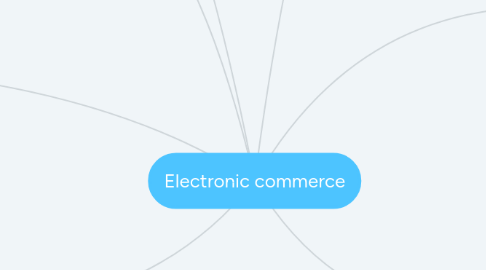
1. E-commerce Business Models
1.1. Business-to-Business (B2B)
1.1.1. (B2B) e-commerce encompasses all electronic transactions of goods or services conducted between companies
1.2. Business-to-Consumer (B2C)
1.3. Consumer-to-Consumer (C2C)
1.3.1. (C2C) type e-commerce encompasses all electronic transactions of goods or services conducted between consumers
1.4. Consumer-to-Business (C2B)
1.5. Government-to-Business (G2B)
1.6. Government-to-Citizen (G2C)
2. Social Networking Sites With Great Potentials for E-Commerce
2.1. Facebook
2.2. Instagram
2.3. Google+
2.4. Twitter
2.5. LinkedIn
2.6. Pinterest
2.7. Tumblr
3. New Careers in E-Commerce
3.1. Business Analyst
3.2. Product Management
3.3. Content Manager
3.4. Design
3.5. Marketing
3.6. Supply Chain
3.7. Product Development
4. Key technologies used in B2B e-commerce
4.1. Electronic Data Interchange (EDI)
4.2. Extranet
4.3. Internet
4.4. Intranet
4.5. Back-End Information System Integration
5. E-commerce Marketing
5.1. Pay-per-click Advertising (PPC)
5.1.1. Businesses bid on impressions for paid listings at the top of search engine results, paying on a per-click basis
5.2. Search Engine Marketing (SEM)
5.2.1. Sometimes used a synonym for PPC, referring to paid advertising campaigns
5.3. Search Engine Optimization (SEO)
5.3.1. SEO traffic comes from unpaid "organic" results on search engines such as Google and Yahoo
5.4. Affiliate Marketing
5.4.1. Referrals from other websites with industry or product-focused content such as reviews, comparisons, and testimonials
5.5. Display Advertising
5.5.1. Banners, sidebars and other predominantly-visual advertisements that appear on other websites
5.6. Email Marketing
5.6.1. Newsletters, abandoned cart notifications and remarketing all use email
6. The principal e-commerce revenue models
6.1. Advertising Revenue Model
6.2. Subscription Revenue Model
6.2.1. Users are charged a periodic (daily, monthly or annual) fee to subscribe to a service
6.3. Transaction Fee Revenue Model
6.4. Sales Revenue Model
6.5. Affiliate Revenue Model
6.5.1. The affiliate program is an online distribution solution which is based on the principle of commission
7. Mobile commerce
7.1. Mobile purchase
7.2. Mobile browsing
7.3. Mobile brokerage
7.3.1. They allow the subscriber to react to market developments in a timely fashion and irrespective of their physical location
7.4. Mobile banking
7.5. Mobile vouchers, coupons and loyalty cards
7.6. Mobile ticketing
7.7. Mobile money transfer
7.8. In-application mobile phone payments
7.8.1. Payments can be made directly inside of an application running on a popular smartphone operating system, such as Google Android

